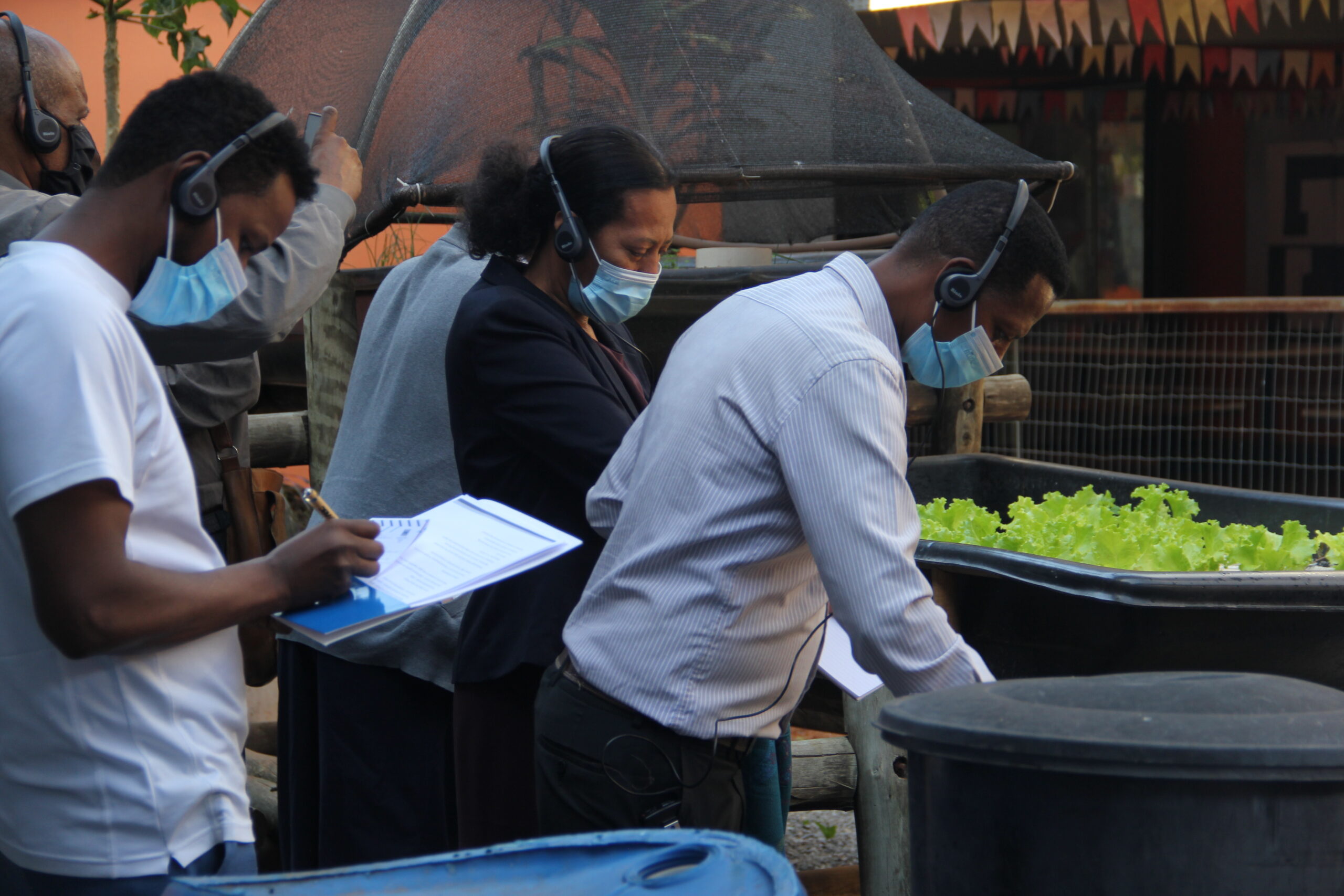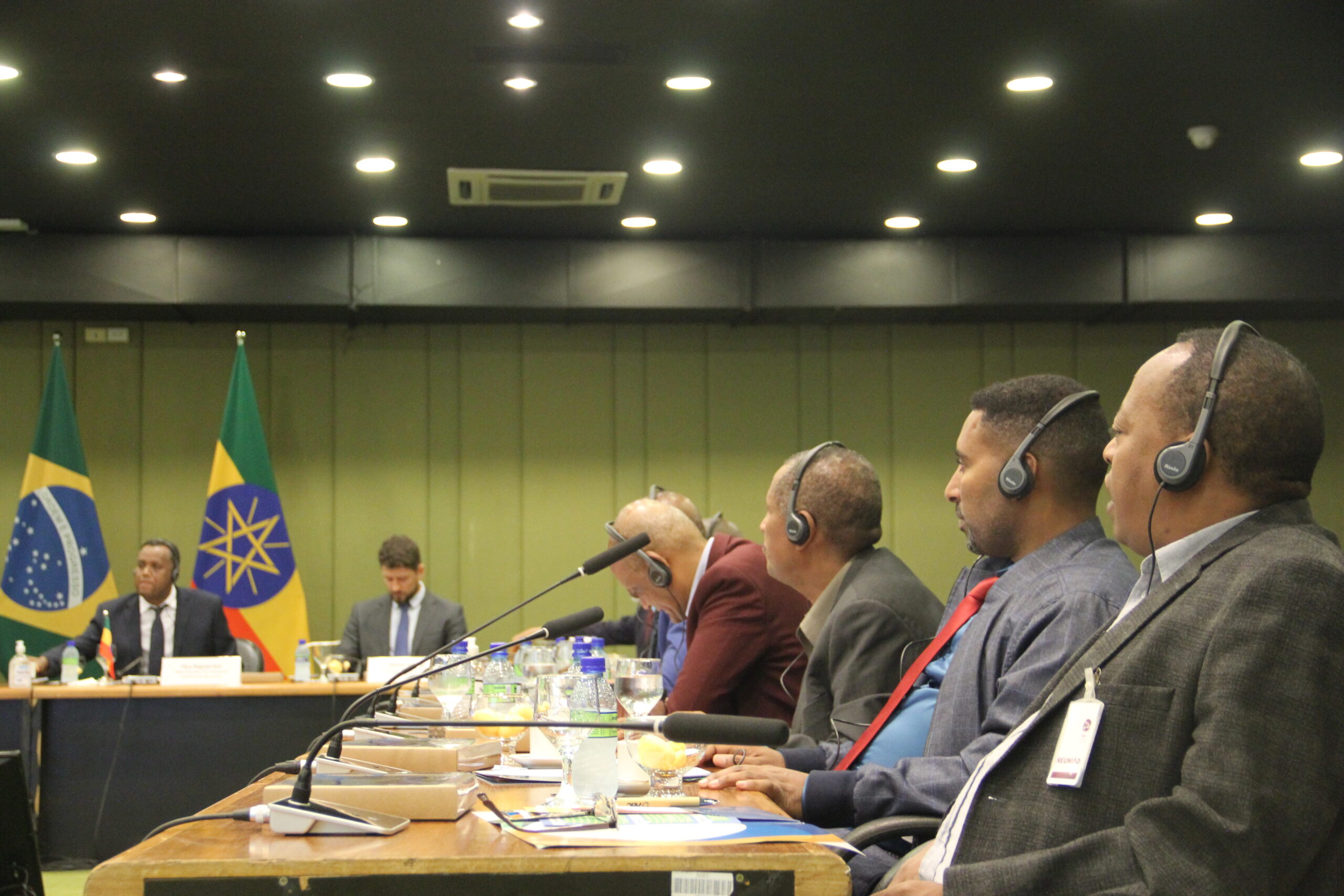
A delegation composed of 16 representatives of the Ethiopian government finalises, on Friday June 10, a week-long field visit to Brasilia to closely observe the Brazilian school feeding programme, especially nutrition and rural development actions. During the visit, the Ministers of Agriculture, Dr. Meles Mekonen Yimer, and of Livestock and Fishery, Dr. Fikru Regassa Gari, specialists from various areas and partners of the NGO Save the Children participated in technical meetings with Brazilian entities and field visits. The face-to-face visit is part of a process of exchanging experiences with Brazil, organized by the WFP Center of Excellence against Hunger Brazil in partnership with the Brazilian Cooperation Agency (ABC) and the National Fund for Education Development (FNDE), and also included virtual meetings.
Ethiopia currently operates a pilot school feeding project in its capital Adis Ababa and the partnership aims to help the country transform its agricultural sector, primarily through nutrition-sensitive policies, promoting knowledge sharing and good practice. “We could see the kind of policy arrangement, with law enforcement, and coordination between different systems, such as agriculture, health, education and economy. These are the systems that we learned in Brazil and that we would like to take home and try to expand what we have started in Addis only,” said Fikru Regassa Street sweeper, Ethiopian Minister of Livestock and Fishery Development.
Another motivator for the delegation’s visit was to find solutions to the country’s child malnutrition problem. On a visit to a public school in Brasilia, the importance of a nutrition-sensitive school feeding programme was evident. Fabiana Napoli, responsible for school feeding at the Escola Parque 313 Sul school, explained that the strategy includes diverse menus, with creative and varied presentations of food, participation of students in the school garden and other activities of food and nutritional education. She explained that the school decided to offer breakfast instead of a mid-morning snack, in addition to a rich lunch: “We let the children serve themselves abundantly because we know that often the only meal they will make that day will be here at the school.”

During a visit to the Technical Assistance and Rural Extension Company of the Federal District (EMATER), in the Planaltina region, the delegation learned the details of the programme to help small farmers and the law that requires that 30% of school food purchases come from family farming. EMATER currently serves more than 2,000 rural properties and about 2,500 families. The main products of the region include fruits, vegetables, flowers, aviculture and livestock. The delegation then moved on to the Araúna farm, run by family farmers receiving EMATER assistance and producing organic food for local consumption and for supply to schools.
The delegation also visited Ceasa-DF (Federal District Supply Centers) and a food bank that receives and distributes food to 161 local institutions. “The Bank provides a link between the institutions and Emater to ensure the quality and variety of food. Therefore, we need to understand the needs of the populations served so that the food is sent with constancy and quality”, explained Lidiane Pires, Director of Food and Nutrition Security at Ceasa.
Dr. Meles Mekonen Yimer, Minister of Agriculture, explained that the country faces malnutrition problems among children, nursing mothers and the general population, as well as facing problems of scarcity and access to food“Here we have seen good experiences specially in school feeding, starting from the head of the government, the legislative, the directorates and the community on the farms, the school and government institutions. We have seen their commitment to include this nutrition issue in their work,” he said.
Tamene Taye, Nutrition Sensitive Agriculture Capacity Strengthening in Ethiopia (NSA CASE) Project Director At Save the Children, said that one of the main aspects observed during the visit was the way policies and country strategies are shared across all levels, from ministers to farming cooperatives. “At every level you have got supportive structure that facilitated the undertaking of specific policy level activities at every administrative level,” he said Tamene Taye also highlighted the importance of family agriculture for nutrition-sensitive programmes. “The rural extension project that Brazil has on the ground is very much organized and the direct linkage with farmer, with feedback mechanism in which farmers express what they want to be trained on. This is an excellent approach in terms of improving productivity and reaching the needs of the farmers on the ground,” he said. The NGO has been working with the Ethiopian government to reduce malnutrition levels and expand the country’s school feeding programme.

Technical meetings
In addition to external visits, the delegation also had the opportunity to talk to Brazilian experts. On the first day, the delegation was welcomed at the headquarters of the Ministry of Foreign Affairs for an opening session with the participation of representatives of the Brazilian Ministry of Agriculture, the WFP Centre of Excellence, the Brazilian Cooperation Agency, the National Fund for The Development of Education and the Ethiopian Embassy in Brazil. The group also met with the General Coordination of Food and Nutrition of the Ministry of Health, the National Supply Company (CONAB) and the Secretariat of Family Agriculture of the Ministry of Agriculture.
On the last day, the technical team of the Centre of Excellence facilitated strategic planning sessions to assist the country in the process of practical application of knowledge acquired during the visit. “Social protection is meant to be integrated and to put together programmes in different areas, such as agriculture support, job creation, food assistance, among others, all working towards one common goal: to create a sustainable policy to fight hunger and to create a country without poverty. If it was possible for a country like Brazil, I strongly believe it is also possible for your country”, said Daniel Balaban, Director of the WFP Centre of Excellence, during his closing remarks.
To learn more about the remote technical assistance work of the WFP Center of Excellence and to learn more about the “Virtual Studies Visit: Brazil” and click here.




